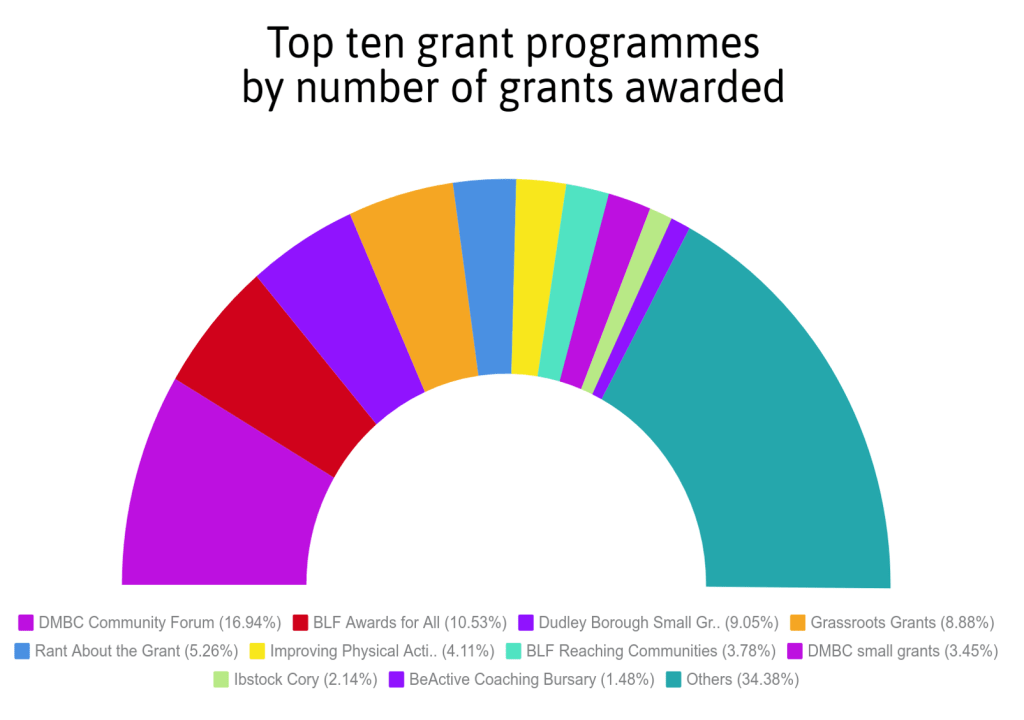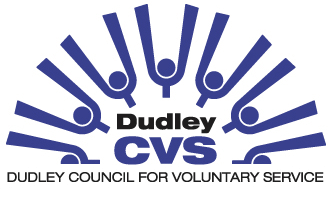Did you know that over the last 11 years, Martin and I have supported nonprofits to access more than £11million in grant funding? You probably didn’t because we only recently realised this ourselves!
Given that Martin and I have recently completed our eleventh year at Dudley CVS, and because we’re both utter geeks when it comes to keeping records of the people and groups we’ve worked with over that time, we thought it would be interesting to pull together all of our data about successful funding applications we’ve worked on. We’re both pretty staggered by (and proud of) the results.
Martin and I joined Dudley CVS within a month of each other back in 2008. Over those years we’ve worked together and helped each other to offer the best support possible to all types and sizes of not-for-profit.
My role is about helping people that want to establish or develop their not-for-profit by providing them with information, guidance and support on a range of topics they’re likely to run into, including:
- What type of not-for-profit? Such as the concept of social enterprise, the definition of charity, appropriate legal structures
- Planning, including long term vision, mission, purpose-setting, project planning, reviewing the organisation, financial planning
- Roles and responsibilities of the people that lead not-for-profits, including governance training for directors and trustees
- Connecting with others, which is becoming increasingly important
- Governing documents and registration
- Compliance – including regulatory obligations, insurance, reporting and policies and procedures
- Profile-raising
- Asset development and asset transfer
- Fundraising and income-generation
When I support groups with funding, it tends to be as part of wider support to help a group become established and ‘funding ready’, such as Dudley Feelgood Choir, Wall Heath Tennis Club and Bayer Street Allotments, though I do also help groups to identify appropriate funders for their work or projects and they do the rest. The idea is to give support in a way that helps groups to become more skilled and confident in putting applications together.
Martin’s role focuses on income-generation and because of this, he primarily supports organisations with larger bids. Martin says,
“Like the support groups give to their beneficiaries to help them to increase their skills, confidence and ability to do things for themselves, the way I work with groups can start quite intensively with a lot of handholding until they are in a position to work on an application themselves with me on hand to review it before it’s submitted. Lots of the people I worked with years ago are now flying with their bidwriting!
I supported Dudley Voices for Choice who received £415,720 at the end of 2018. What stood out for me was how the group involved their beneficiaries throughout the process as well as the enthusiasm of the partners in the project led excellently by Sarah.
Overall 80% of the organisations I have supported during the last 11 years have received funding.
Over the last eleven years, between us, we’ve supported:
261 organisations
With 614 successful applications
To 113 grants programmes
Totalling £11,764,436.65 (65p!)”
Of course, this only covers the work that Martin and I have done to support organisations as that’s the data we have to hand. The real total over that eleven years is likely to be much higher if we could incorporate the support that our previous colleagues gave too. On top of that, for obvious reasons, we can only include the successes that our groups have told us about, which doesn’t always happen. Nonetheless, there’s some interesting things to say about the figures we’ve got.
- The largest single grant was for £800,000 from the Football Foundation to a local community football club (one of Martin’s)
- The smallest grants were two £30 grants from TESCO and the Blakemore Foundation to help the Seniors Luncheon Club get started in 2009 (they’re still going now!)
Here’s a breakdown by grant size:

86% of grants were valued at £10,000 or less. The majority of grants (35%) were for under £1,000, while 33% of grants ranged from £1,000-£5,000. This means well over half the grants (68%) were awards of up to £5,000. 18% of grants were between £5,000 and £10,000 in value. I think this suggests that most of these awards are contributions towards project costs, rather than core funding.
Which funding programmes have been the most accessed by the groups we’ve supported over the last decade? This graphic shows us:

67 of the 113 (59%) of funding programmes made one grant only (that we know of), the remaining 41% gave multiple grants amongst the groups we supported. When we support groups, we help them to identify the most appropriate funders for their needs, matching projects to funders’ interests areas and criteria. This is why there is a spread of 113 grants programmes.
Within that, the ten most prolific grants programmes were:
- Dudley Council’s Community Forums (including previous Area Committee funding)
- Awards for All (National Lottery Community Fund, formerly Big Lottery Fund)
- Dudley Borough Small Grants Fund
- Grassroots Grants
- Rant About the Grant
- Improving Physical Activity Fund
- Reaching Communities (National Lottery Community Fund, formerly Big Lottery Fund)
- Dudley Council’s Small Grants Fund
- Ibstock Enovert Environmental Trust (formerly Ibstock Cory Environmental Trust)
- BeActive Coaching Bursary
What’s staggering in this list is that 6 of the ten programmes no longer operate and have not been in operation for some years now (programmes that have come to an end are: Dudley Borough Small Grants Fund, Grassroots Grants, Rant About the Grant, Improving Physical Activity Fund, Dudley Council’s Small Grants, BeActive Coaching Bursary). This chimes with our knowledge and our increasing encouragement of groups to look to new sources of income as grant funding opportunities continue to reduce, because the four remaining funders may not be able to increase their level of award.
What else can we say about these grants programmes? We can see how much they have granted the Dudley borough groups we’ve supported:

An enormous 55% of funding awarded to the groups we’ve supported has come from Reaching Communities, that’s £6,507,553.00 of the £11,764,436.65 total! This is perhaps due to a combination of the size of grants available through this programme, its popularity as a programme and the relatively high success rate it enjoys. Other popular programmes like Awards for All and the Community Forums give smaller grants (up to £10,000 and £5,000 respectively).
Martin says,
“As regards Reaching Communities I have a success rate of almost 60% in both number of successful applications and grant values. 50% of the groups I’ve supported with Reaching Communities have received repeat funding from that programme. These include Phase Trust (3), Dudley Counselling Centre/Dudley Community Church (3), Beacon Centre for the Blind (2), Age UK (2) and Headway Black Country (2).
As for high-value grants, some of my highlights are:
£538,524 over 3 applications to an organisation that supports older people
£513,525 over 3 applications to a disability charity
£1,238,328 from 10 applications from a faith-based organisation that supports vulnerable and disadvantaged people
£679,411 across 4 applications from an advocacy charity
£646,272 from 4 applications by a health-based charity
7 applications with a family support charity, totaling £289,016
7 applications supported with a young persons charity, totaling £1,019,710
15 applications supported from a charity that empowers disadvantaged people, totaling £566,465
6 successful applications supported from a young persons advocacy charity, totaling £614,592″
The National Lottery Community Fund (formerly known as the Big Lottery Fund) which runs Reaching Communities, features elsewhere in this top ten, with Awards for All, Advice Services Fund and the Youth Investment Fund accounting for around 10% of money awarded. So what does the picture look like if we combine the programmes run by one funder?

Unsurprisingly, the National Lottery Community Fund makes up 65% of the total money awarded to groups we’ve supported over the past eleven years. Other funders have contributed as follows:
- Football Foundation 6.8%
- Young People’s Fund 2.62%
- Dudley Council 2.51%
- BBC Children in Need 2.42%
- Lloyds Bank Foundation 2.39%
- Building Better Opportunities 2.38%
- Sport England 1.89%
- Ibstock Cory Environmental Trust 1.6%
- Grassroots Grants 1.3%
- Remaining funders combined 11.25
The National Lottery Community Fund is still keen to fund Dudley borough organisations and we have great links with John Goodman, the Funding Officer from The National Lottery Community Fund who covers our patch. John is available at our office on Wednesdays to meet organisations interested in accessing funding from The National Lottery Community Fund. To arrange an appointment, email John at john.goodman@tnlcommunityfund.org.uk.
A new fund for Dudley borough
Finally, Dudley CVS has recently launched a new fund for organisations that can develop and provide creative support for people who frequently use unplanned emergency care services (such as calling 999, attending A&E or Urgent Care Centre).
Grants of up to £5,000 are available to support this work and there are no deadlines. For more information, visit: https://interests.me/org/dudleycvs/story/177364





